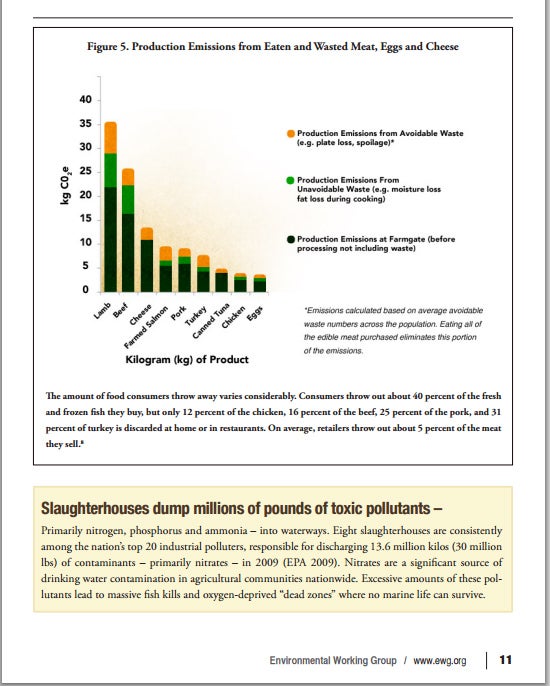 Join us in the “Meatless Mondays” challenge. Eating less meat reduces demand, greenhouse gas emissions, water pollution, and our carbon footprint, all from changing one simple meal choice. All dining halls offer meatless options, too, so it is super easy.
Join us in the “Meatless Mondays” challenge. Eating less meat reduces demand, greenhouse gas emissions, water pollution, and our carbon footprint, all from changing one simple meal choice. All dining halls offer meatless options, too, so it is super easy.
Top 3 Reasons to go meatless once a week
For the Environment:
* Reduce your carbon footprint
* Minimize Water Usage
* Fight deforestation
* Reduce land degradation
* Protect wildlife and plant Biodiversity
* Reduce Greenhouse Gases
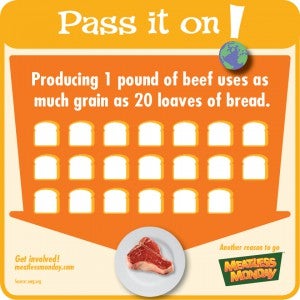 For Your Health:
For Your Health:
* Reduce Heart Disease and Stroke
* Limit Cancer Risk
* Fight Diabetes
* Curb Obesity
* Improve The Nutritional Quality of Your Diet
* Live longer
For Your Wallet:
* Curb Healthcare Spending
* Cut Weekly Budget
Hi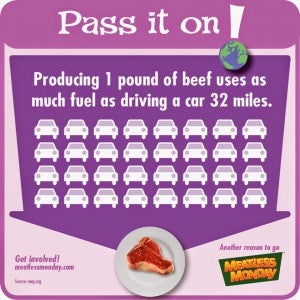 story & Highlights
story & Highlights
Before the movement to reduce eating meat for health, environmental and animal welfare reasons, the U.S. government introduced “Meatless Monday” and “Wheatless Wednesday” to help feed our troops and allies during World War I and II.
1917: The U.S. Food Administration (USFA) launched a campaign to encourage Americans to conserve food during World War I which became known by the slogan “Food Will Win the War”. One element of the program was “Meatless Monday”. To help get people on board, the USFA distributed posters, educational materials, recipes, and conducted cooking demonstrations. The result was a voluntary 15% reduction of domestic food consumption.
19 42: The Food Rationing Program was instituted during World War II. Families were issued a “War Ration Book”. Each stamp authorized a purchase of rationed goods in the quantity and at the time designated. “Red Stamp” rationing covered all meats, butter, fat, and oils, and with some exceptions, cheese. “Meatless Monday” returned as one means of reducing meat consumption.
42: The Food Rationing Program was instituted during World War II. Families were issued a “War Ration Book”. Each stamp authorized a purchase of rationed goods in the quantity and at the time designated. “Red Stamp” rationing covered all meats, butter, fat, and oils, and with some exceptions, cheese. “Meatless Monday” returned as one means of reducing meat consumption.
2003: A former ad executive and health advocate named Sid Lerner reintroduced “Meatless Monday” as a public health awareness campaign. The initiative was backed by Johns Hopkins Bloomberg School of Public Health’s Center for a Livable Future and other institutions.
2005: A nonprofit public health initiative, The Monday Campaigns, was founded in association with Columbia University, Johns Hopkins University, and Syracuse University.
2009: The “Meatless Monday” movement gained momentum and spread across the world as individuals and families were joined by countries, cities, celebrities, schools, restaurants, and food service companies.
For more information, visit: http://www.meatlessmonday.com/
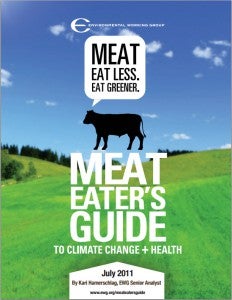
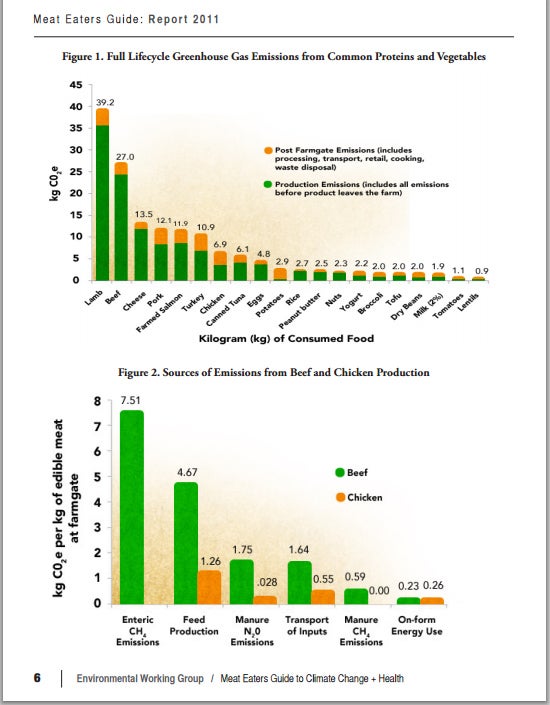 A Meat Eater’s Guide to
A Meat Eater’s Guide to
Climate Change + Health:
* What You Eat Matters *
Eat Less Meat + Cheese and
Buy Greener When You Do
Americans’ appetite for meat and dairy – billions of pounds a year from billions of animals – takes a toll on our health, the environment, climate and animal welfare. Producing all this meat and dairy requires large amounts of pesticides, chemical fertilizer, fuel, feed and water. It also generates greenhouse gases and large amounts of toxic manure and wastewater that pollute groundwater, rivers, streams and, ultimately, the ocean. In addition, eating large quantities of beef and processed meats increases your exposure to toxins and is linked to higher rates of health problems, including heart disease, cancer and obesity.
U.S. meat consumption has held steady for the past several years, but Americans consume 60 per cent more than Europeans (FAO 2009) and the global appetite for meat is exploding. From 1971 to 2010, worldwide production of meat tripled to around 600 billion pounds while global population grew by just 81 percent (US Census Bureau, International Data Base). At this rate, production will double by 2050 to approximately 1.2 trillion pounds of meat per year… READ MORE.
 story & Highlights
story & Highlights

